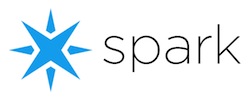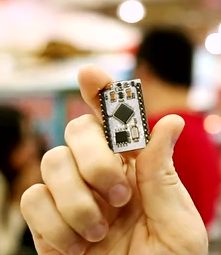[Note: This post first appeared earlier today at Minnov8.com.]
 Minneapolis-based Spark Devices today launched a new project on Kickstarter in a major reboot of the company. The new Kickstarter comes as the cofounders are about to complete an accelerator program in China called HAXLR8R (“hack-celerator” – get it?). It’s described as “a new kind of accelerator program for people who hack hardware and make things.” (Mentors include Brad Feld, Nolan Bushnell, and a host of others.) The Demo Day for the current class is May 13.
Minneapolis-based Spark Devices today launched a new project on Kickstarter in a major reboot of the company. The new Kickstarter comes as the cofounders are about to complete an accelerator program in China called HAXLR8R (“hack-celerator” – get it?). It’s described as “a new kind of accelerator program for people who hack hardware and make things.” (Mentors include Brad Feld, Nolan Bushnell, and a host of others.) The Demo Day for the current class is May 13.
“There’s been a lot of excitement around Internet-connected devices, but the barrier’s always been pretty high because building Wi-Fi into a product is surprisingly expensive and difficult,” said Zach Supalla, cofounder and CEO. “We want to take down that barrier so that people can experiment with Internet-connected products as freely as they do with electronics in general using an Arduino.”

Spark Devices is building an open source development kit for Wi-Fi enabled products. “Spark Core” — it’s first product (and the name of the Kickstarter project) — is an Arduino-compatible, Wi-Fi enabled, cloud-powered development platform that makes creating Internet-connected hardware a breeze. The team confidently state on its new Kickstarter page, “There’s nothing you can’t build with the Core.”
How big is this “Internet of Things” (IoT) thing?
How does 24 billion devices connected by 2020 grab you? How does the notion of “transforming everything” grab you? A recent survey on IoT found 66% of IT professionals actually believe it will play a part in business and consumer technology converging within 3-5 years. (More about that SAP/Harris Interactive study in this post from ReadWrite Cloud.)
As Spark Devices aptly puts it, “we’re entering a world where products listen and communicate.” It notes that, so far, the Internet of Things is being driven by startups — think Pebble Watch, FitBit, the Nest thermostat, and others that are disrupting sleepy old product categories. But the founders rightly see a huge opportunity to help thousands of established companies take advantage of this connected-devices movement. [That's right, so they don't get disrupted .]
Spark Core works like an Arduino with integrated Wi-Fi. It’s powered by the new Texas Instruments CC3000 Wi-Fi module, and can be easily integrated into any circuit board.
How to manage all these devices?
Spark Core isn’t all that’s being debuted in this Kickstarter project. The company is also announcing it will be building a cloud service to manage its Wi-Fi enabled products in the field. The “Spark Cloud” is a
 scalable, managed infrastructure for communicating with all Spark-powered devices — an open but secure system, with a developer-friendly REST API. A key point: this cloud will enable over-the-air firmware updates to improve products over time. Read the FAQ on the Kickstarter project. If you’re a hacker, it will blow your mind.
scalable, managed infrastructure for communicating with all Spark-powered devices — an open but secure system, with a developer-friendly REST API. A key point: this cloud will enable over-the-air firmware updates to improve products over time. Read the FAQ on the Kickstarter project. If you’re a hacker, it will blow your mind.
How to back Spark
Spark Core is being sold for $39 on the company’s Kickstarter project page, and later will be sold on its website and through electronics distributors. But if you move fast, 200 Spark Cores are available for $29 each on Kickstarter as an Early-Bird Special. And there are other great options to back the Kickstarter project.
What can you build with Spark Core and Spark Cloud?
Sample products cited on the Kickstarter page include things like a wireless motion detector, a solar-powered security camera, or even, as the Kickstarter video shows, a “pizza orderer.” To say the possibilities are limitless is not exaggerating.
Here’s more on the Spark Devices team:
• Zach Supalla, CEO. Formerly worked at McKinsey (operations and product development) and Groupon. Kellogg (MBA), McCormick (MEM), Dartmouth (BA).

• Zachary Crockett, CTO. Software developer with broad experience across platforms (Ruby, Java, Objective C). U of MN (Ph.D), Vanderbilt (BA).
• Stephanie Rich, VP of Biz Dev. Former director of sales and marketing in the film industry (GreeneStreet Films). Cambridge (MBA), Northwestern’s Medill School of Journalism (BS).
• Will Hart, Design Engineer. Cook Engineering Design Fellow at Dartmouth College. BE and ME in Mechanical Engineering, Dartmouth.
[Recent photo shows the team in China, minus Steph, who stayed home in Minneapolis to hold down the fort. Left to right: Zach, Zachary, Will.]
The partnership with the aforementioned HAXLR8R hardware-focused incubator, based in Shenzhen, China, provides Spark Devices an extensive ecosystem of mentors, investors, and fellow startups.
For more on Spark Devices, see its latest web site, and follow the company on Twitter and Facebook. Also catch the founders at the upcoming Bay Area Maker Faire, and (I personally hope) at the Glue Conference later in May. Then, soon, the entire team will be back home hard at work at CoCo Minneapolis at the Grain Exchange.
Congrats to Spark Devices: another great example of Minnesota tech innovation — gone global!

Recent Comments